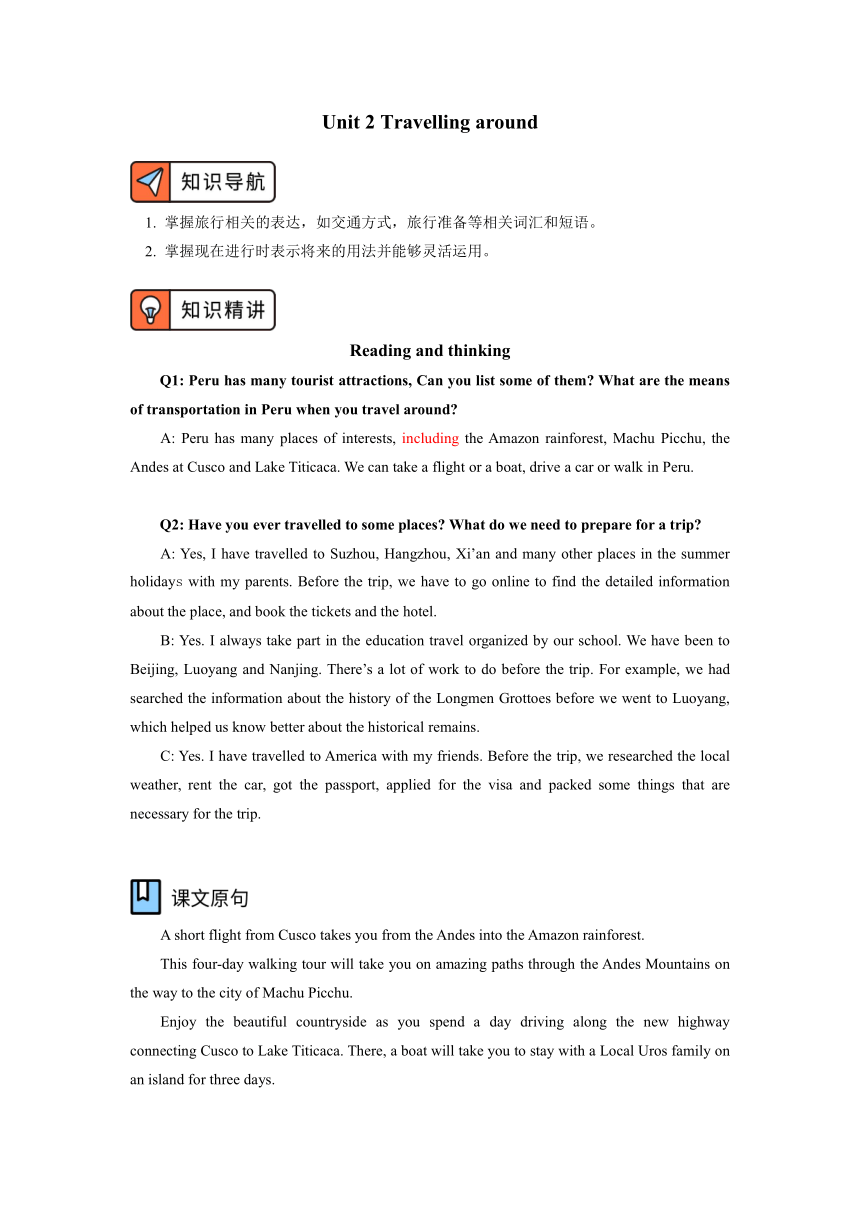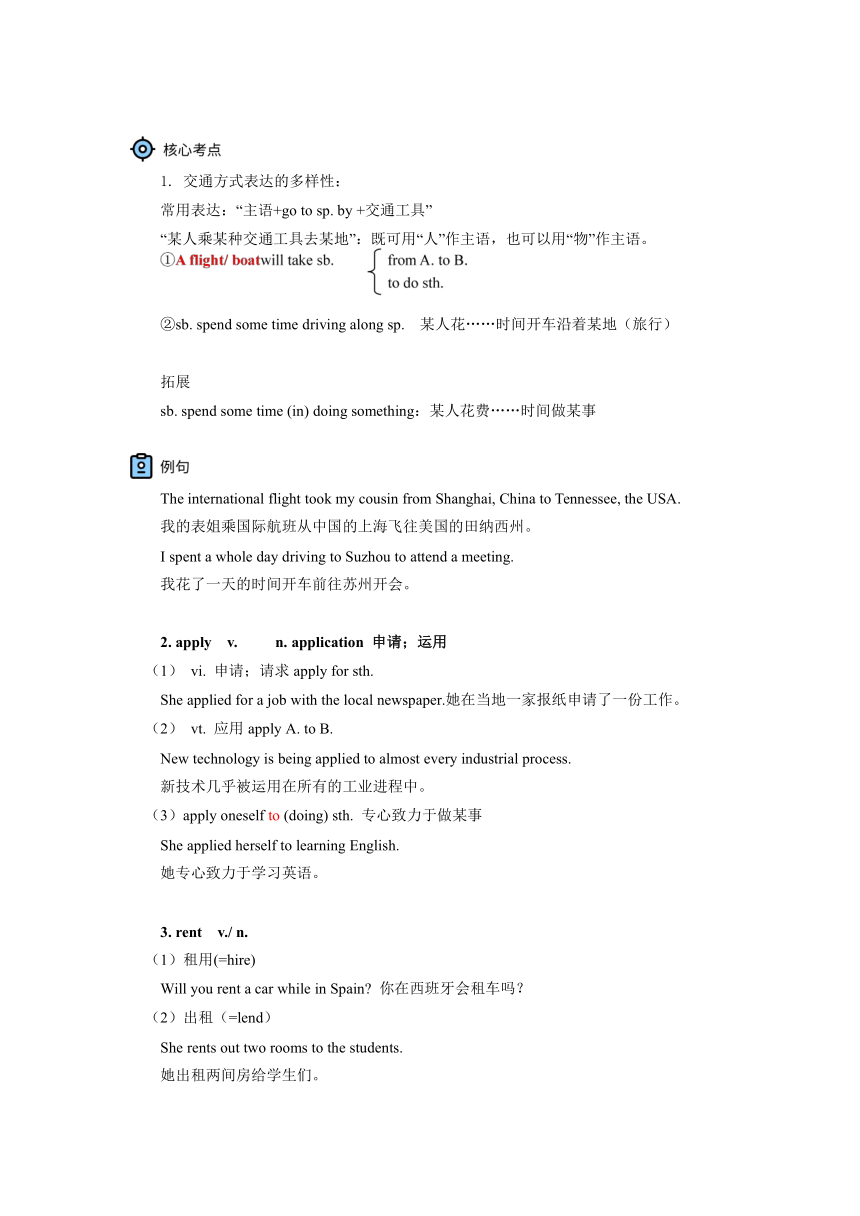高中英语人教版(2019)必修一 Unit 2 Travelling Around学案
文档属性
| 名称 | 高中英语人教版(2019)必修一 Unit 2 Travelling Around学案 |  | |
| 格式 | docx | ||
| 文件大小 | 72.9KB | ||
| 资源类型 | 教案 | ||
| 版本资源 | 人教版(2019) | ||
| 科目 | 英语 | ||
| 更新时间 | 2021-02-06 12:34:04 | ||
图片预览


文档简介
Unit 2 Travelling around
1. 掌握旅行相关的表达,如交通方式,旅行准备等相关词汇和短语。
2. 掌握现在进行时表示将来的用法并能够灵活运用。
Reading and thinking
Q1: Peru has many tourist attractions, Can you list some of them? What are the means of transportation in Peru when you travel around?
A: Peru has many places of interests, including the Amazon rainforest, Machu Picchu, the Andes at Cusco and Lake Titicaca. We can take a flight or a boat, drive a car or walk in Peru.
Q2: Have you ever travelled to some places? What do we need to prepare for a trip?
A: Yes, I have travelled to Suzhou, Hangzhou, Xi’an and many other places in the summer holidays with my parents. Before the trip, we have to go online to find the detailed information about the place, and book the tickets and the hotel.
B: Yes. I always take part in the education travel organized by our school. We have been to Beijing, Luoyang and Nanjing. There’s a lot of work to do before the trip. For example, we had searched the information about the history of the Longmen Grottoes before we went to Luoyang, which helped us know better about the historical remains.
C: Yes. I have travelled to America with my friends. Before the trip, we researched the local weather, rent the car, got the passport, applied for the visa and packed some things that are necessary for the trip.
A short flight from Cusco takes you from the Andes into the Amazon rainforest.
This four-day walking tour will take you on amazing paths through the Andes Mountains on the way to the city of Machu Picchu.
Enjoy the beautiful countryside as you spend a day driving along the new highway connecting Cusco to Lake Titicaca. There, a boat will take you to stay with a Local Uros family on an island for three days.
1. 交通方式表达的多样性:
常用表达:“主语+go to sp. by +交通工具”
“某人乘某种交通工具去某地”:既可用“人”作主语,也可以用“物”作主语。
②sb. spend some time driving along sp. 某人花……时间开车沿着某地(旅行)
拓展
sb. spend some time (in) doing something:某人花费……时间做某事
The international flight took my cousin from Shanghai, China to Tennessee, the USA.
我的表姐乘国际航班从中国的上海飞往美国的田纳西州。
I spent a whole day driving to Suzhou to attend a meeting.
我花了一天的时间开车前往苏州开会。
2. apply v. n. application 申请;运用
(1) vi. 申请;请求apply for sth.
She applied for a job with the local newspaper.她在当地一家报纸申请了一份工作。
(2) vt. 应用apply A. to B.
New technology is being applied to almost every industrial process.
新技术几乎被运用在所有的工业进程中。
(3)apply oneself to (doing) sth. 专心致力于做某事
She applied herself to learning English.
她专心致力于学习英语。
3. rent v./ n.
(1)租用(=hire)
Will you rent a car while in Spain? 你在西班牙会租车吗?
(2)出租(=lend)
She rents out two rooms to the students.
她出租两间房给学生们。
Some suggestions before travelling abroad:
1. Apply for a visa;
2. Get a passport;
3. Book tickets and hotel;
4. Rent a walk-on wifi;
5. Exchange foreign currency;
6. Get to know the travel strategies written by others.
改错:
On the second day, she got things pack, forcing her nephew to go on the adventure with her together.
将pack改成packed
Last year she applied membership in the party.
在apply后加上for
Reading for writing
Q1: What is Richard’s travel plan? What places does he want to travel to?
A: Richard is planning to go to Xi’an to see the Terracotta Army with his family.?His family members are both looking forward to going to Shaanxi History Museum, Xi’an City wall and a few other famous sights.
Q2: Do you have travel plans for future holidays?
A: I want to go to Sanya with my elder sister next week. I like the blue sky and sea, which is so attractive. I look forward to lying on the beach to enjoy fresh air and the sunshine.
B: I would like to go to Bangkok with my friends, because everything there is so cheap (hotels, food, tours, shopping, etc.). Bangkok is easy to explore. It’s rich in culture. It has the best food in Southeast Asia.
C: My parents and I are going to Britain in winter vacation. Because I want to apply for a college when I graduate from senior high school. So I’d like to get to know more about British culture and customs.
Richard is planning to go to Xian to see the Terracotta Army with his family.?
His family members are both looking forward to going to Shaanxi History Museum, Xi’an City wall and a few other famous sights.
现在进行时表示将来的意义,常有“意图”“安排”或“打算”的含义。其中的谓语动词绝大多数是位移动词,如arrive, come, drive, fly, go, leave, travel等。
(1) come, go, stay, arrive, leave 等词的现在进行时经常用来表示将来确切的计划。
(2) fly,walk, ride, drive, take(a bus)等词的现在进行时经常用来表示交通方式、行程安排。
We’re leaving for Changsha tomorrow. 我们明天就去长沙。
I am flying to America tomorrow morning. 我明天一大早飞往美国。
Some useful expressions:
1. I’d like to have a seat by the window/aisle.
我要一个靠窗/靠过道的座位。
2. I’d like to reconfirm my flight from … to ….
我要再确认一下我从……到……的班机。
3. I’d like a refund on this ticket.
我要退这张票。
4. I’ve got … pieces together. Are they overweight?
我一共……件行李超重吗?
5. Please deliver the baggage to my hotel as soon as you’ve located it.
一旦找到行李,请立即送到我住的饭店。
6. Will this flight get there on time?
这班班机会准时到达吗?
7. I’m anxious about my connecting flight.
我担心能否赶上转机班机。
8. I’ll arrive late, but please keep my reservation.
我会晚一点到达,请保留预定的房间。
9. I’d like to check out. My bills, please.
我要退房。请给我账单。
10. Is there a duty-free shop?
这有免税店吗?
I want to know when he _______ for New York tomorrow.
A. has left B. is leaving C. had left D. has been leaving
答案:B
解析:分析语境逻辑可知,该空表将来动作,因为leave表“出发”,可用现在进行时代替一般将来时。
1. 掌握旅行相关的表达,如交通方式,旅行准备等相关词汇和短语。
2. 掌握现在进行时表示将来的用法并能够灵活运用。
Reading and thinking
Q1: Peru has many tourist attractions, Can you list some of them? What are the means of transportation in Peru when you travel around?
A: Peru has many places of interests, including the Amazon rainforest, Machu Picchu, the Andes at Cusco and Lake Titicaca. We can take a flight or a boat, drive a car or walk in Peru.
Q2: Have you ever travelled to some places? What do we need to prepare for a trip?
A: Yes, I have travelled to Suzhou, Hangzhou, Xi’an and many other places in the summer holidays with my parents. Before the trip, we have to go online to find the detailed information about the place, and book the tickets and the hotel.
B: Yes. I always take part in the education travel organized by our school. We have been to Beijing, Luoyang and Nanjing. There’s a lot of work to do before the trip. For example, we had searched the information about the history of the Longmen Grottoes before we went to Luoyang, which helped us know better about the historical remains.
C: Yes. I have travelled to America with my friends. Before the trip, we researched the local weather, rent the car, got the passport, applied for the visa and packed some things that are necessary for the trip.
A short flight from Cusco takes you from the Andes into the Amazon rainforest.
This four-day walking tour will take you on amazing paths through the Andes Mountains on the way to the city of Machu Picchu.
Enjoy the beautiful countryside as you spend a day driving along the new highway connecting Cusco to Lake Titicaca. There, a boat will take you to stay with a Local Uros family on an island for three days.
1. 交通方式表达的多样性:
常用表达:“主语+go to sp. by +交通工具”
“某人乘某种交通工具去某地”:既可用“人”作主语,也可以用“物”作主语。
②sb. spend some time driving along sp. 某人花……时间开车沿着某地(旅行)
拓展
sb. spend some time (in) doing something:某人花费……时间做某事
The international flight took my cousin from Shanghai, China to Tennessee, the USA.
我的表姐乘国际航班从中国的上海飞往美国的田纳西州。
I spent a whole day driving to Suzhou to attend a meeting.
我花了一天的时间开车前往苏州开会。
2. apply v. n. application 申请;运用
(1) vi. 申请;请求apply for sth.
She applied for a job with the local newspaper.她在当地一家报纸申请了一份工作。
(2) vt. 应用apply A. to B.
New technology is being applied to almost every industrial process.
新技术几乎被运用在所有的工业进程中。
(3)apply oneself to (doing) sth. 专心致力于做某事
She applied herself to learning English.
她专心致力于学习英语。
3. rent v./ n.
(1)租用(=hire)
Will you rent a car while in Spain? 你在西班牙会租车吗?
(2)出租(=lend)
She rents out two rooms to the students.
她出租两间房给学生们。
Some suggestions before travelling abroad:
1. Apply for a visa;
2. Get a passport;
3. Book tickets and hotel;
4. Rent a walk-on wifi;
5. Exchange foreign currency;
6. Get to know the travel strategies written by others.
改错:
On the second day, she got things pack, forcing her nephew to go on the adventure with her together.
将pack改成packed
Last year she applied membership in the party.
在apply后加上for
Reading for writing
Q1: What is Richard’s travel plan? What places does he want to travel to?
A: Richard is planning to go to Xi’an to see the Terracotta Army with his family.?His family members are both looking forward to going to Shaanxi History Museum, Xi’an City wall and a few other famous sights.
Q2: Do you have travel plans for future holidays?
A: I want to go to Sanya with my elder sister next week. I like the blue sky and sea, which is so attractive. I look forward to lying on the beach to enjoy fresh air and the sunshine.
B: I would like to go to Bangkok with my friends, because everything there is so cheap (hotels, food, tours, shopping, etc.). Bangkok is easy to explore. It’s rich in culture. It has the best food in Southeast Asia.
C: My parents and I are going to Britain in winter vacation. Because I want to apply for a college when I graduate from senior high school. So I’d like to get to know more about British culture and customs.
Richard is planning to go to Xian to see the Terracotta Army with his family.?
His family members are both looking forward to going to Shaanxi History Museum, Xi’an City wall and a few other famous sights.
现在进行时表示将来的意义,常有“意图”“安排”或“打算”的含义。其中的谓语动词绝大多数是位移动词,如arrive, come, drive, fly, go, leave, travel等。
(1) come, go, stay, arrive, leave 等词的现在进行时经常用来表示将来确切的计划。
(2) fly,walk, ride, drive, take(a bus)等词的现在进行时经常用来表示交通方式、行程安排。
We’re leaving for Changsha tomorrow. 我们明天就去长沙。
I am flying to America tomorrow morning. 我明天一大早飞往美国。
Some useful expressions:
1. I’d like to have a seat by the window/aisle.
我要一个靠窗/靠过道的座位。
2. I’d like to reconfirm my flight from … to ….
我要再确认一下我从……到……的班机。
3. I’d like a refund on this ticket.
我要退这张票。
4. I’ve got … pieces together. Are they overweight?
我一共……件行李超重吗?
5. Please deliver the baggage to my hotel as soon as you’ve located it.
一旦找到行李,请立即送到我住的饭店。
6. Will this flight get there on time?
这班班机会准时到达吗?
7. I’m anxious about my connecting flight.
我担心能否赶上转机班机。
8. I’ll arrive late, but please keep my reservation.
我会晚一点到达,请保留预定的房间。
9. I’d like to check out. My bills, please.
我要退房。请给我账单。
10. Is there a duty-free shop?
这有免税店吗?
I want to know when he _______ for New York tomorrow.
A. has left B. is leaving C. had left D. has been leaving
答案:B
解析:分析语境逻辑可知,该空表将来动作,因为leave表“出发”,可用现在进行时代替一般将来时。
